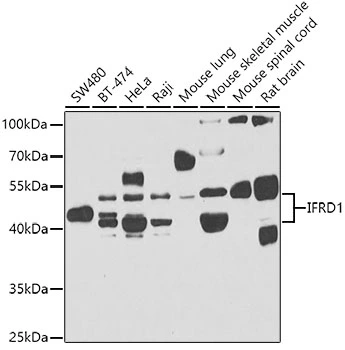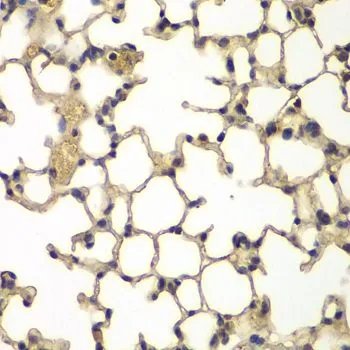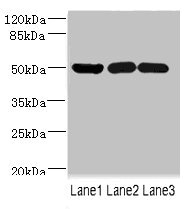
WB analysis of various sample lysates using GTX64705 IFRD1 antibody. Dilution : 1:1000 Loading : 25microg per lane
IFRD1 antibody
GTX64705
ApplicationsWestern Blot, ImmunoHistoChemistry, ImmunoHistoChemistry Paraffin
Product group Antibodies
TargetIFRD1
Overview
- SupplierGeneTex
- Product NameIFRD1 antibody
- Delivery Days Customer9
- Application Supplier NoteWB: 1:500 - 1:2000. IHC-P: 1:50 - 1:100. *Optimal dilutions/concentrations should be determined by the researcher.Not tested in other applications.
- ApplicationsWestern Blot, ImmunoHistoChemistry, ImmunoHistoChemistry Paraffin
- CertificationResearch Use Only
- ClonalityPolyclonal
- ConjugateUnconjugated
- Gene ID3475
- Target nameIFRD1
- Target descriptioninterferon related developmental regulator 1
- Target synonymsPC4, TIS7, interferon-related developmental regulator 1, 12-O-tetradecanoylphorbol-13-acetate-induced sequence 7, TPA induced sequence 7, nerve growth factor-inducible protein PC4, pheochromocytoma cell-4
- HostRabbit
- IsotypeIgG
- Protein IDO00458
- Protein NameInterferon-related developmental regulator 1
- Scientific DescriptionThis gene is an immediate early gene that encodes a protein related to interferon-gamma. This protein may function as a transcriptional co-activator/repressor that controls the growth and differentiation of specific cell types during embryonic development and tissue regeneration. Mutations in this gene are associated with sensory/motor neuropathy with ataxia. This gene may also be involved in modulating the pathogenesis of cystic fibrosis lung disease. Alternate splicing results in multiple transcript variants. [provided by RefSeq, Oct 2010]
- Storage Instruction-20°C or -80°C,2°C to 8°C
- UNSPSC12352203





